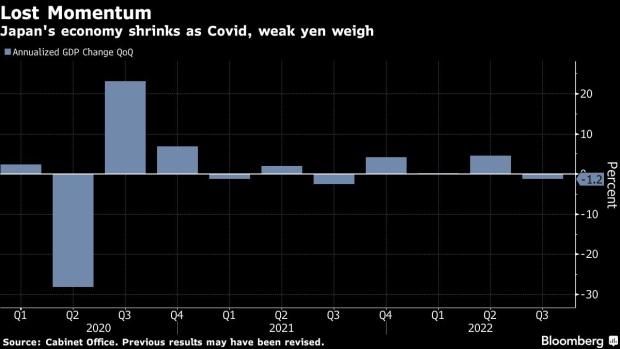Nov 14, 2022
Japan’s Economy Unexpectedly Shrinks on Hit From Weak Yen, Covid
, Bloomberg News

(Bloomberg) -- Japan’s economy unexpectedly shrank in the three months through September as the yen’s historic slide battered growth momentum, leaving the country’s recovery from the pandemic in a vulnerable spot amid mounting fears of a global slowdown.
Gross domestic product contracted at an annualized pace of 1.2% in the third quarter, slipping into reverse for the first time since last year as weakness in the currency inflated the country’s import bill, Cabinet Office figures showed Tuesday. Economists had expected an expansion of 1.2%.
The surprise contraction reflects the impact of Japan’s embattled currency on the economy and shows the path toward a solid recovery from the pandemic remains long, with further risks clouding the outlook.
Policymakers will be hoping that the government’s latest economic stimulus package will help shore up growth over the coming months. The reopening of Japan’s borders also offers the prospect of a renewed inbound spending by foreign tourists attracted by a country that has become much cheaper to travel around.
“When the yen falls this fast, companies face a tough situation in that they are hit by higher import costs of materials while they can’t easily pass on costs to exports when overseas economies are slowing down,” said Harumi Taguchi, principal economist at S&P Global Market Intelligence.
The plunge in the yen has amplified the energy-needy country’s already soaring import bill, weighing on net trade. Japan acted in late September to prop up the currency for the first time in more than two decades after the currency had shed more than 20% against the dollar this year.
The government continued to step into markets in October, bringing its intervention spending to as much as $65 billion. The plunge in the currency has largely been driven by the divergence between the Bank of Japan’s rock-bottom interest rates and sharply higher borrowing costs in the US.
The BOJ is sticking to its view that the economy needs continued support and that inflationary pressure needs solid wage growth to make price growth sustainable and beneficial for the economy. Most economists see no change in monetary policy likely while BOJ Governor Haruhiko Kuroda rides out the final months of his decade-long tenure.
Fearing another setback in Japan’s recovery as the weak yen drives up energy costs and inflation, Prime Minister Fumio Kishida last month put together an economic stimulus package that includes aid to keep a lid on energy prices for households and businesses. His cabinet approved an extra budget of 29.1 trillion yen ($207 billion) to fund these measures.
What Bloomberg Economics Says...
“Looking ahead, we expect GDP growth to accelerate in 4Q. A fiscal stimulus package that includes domestic travel subsidies, together with an increase in inbound tourism on the back of relaxed border restrictions, will likely support the economy. Higher inflation and weaker external demand remain downside risks.”
-- Yuki Masujima, economist
For the full report, click here
Policymakers played down the unexpected contraction, pointing to signs of continued growth outside the drag on the economy from imports.
“There’s no change. The economy is still gradually picking up, driven by private sector demand,” said economy minister Shigeyuki Goto after the result. “Still, there’s a need to watch out for a global economic slowdown.”
The data showed that consumer spending cooled sharply in the quarter as Japan suffered a record Covid-19 wave in the summer, with the number of daily new cases hitting 200,000 in August. While the government didn’t bring back virus-related restrictions this time, the resurgence of infections led some people to refrain from going out.
Growth in business spending also slowed as companies tried to weigh up for a continued recovery against the likelihood of a global slowdown as policy tightening led by the Federal Reserve crimps activity.
Like many of its global peers, Japan is also suffering from accelerating inflation that is weakening consumers’ purchasing power. In September, nationwide inflation surpassed 3% for the first time in over three decades, excluding the impact from tax hikes. Real wages, however, have been declining for six months since April.
“With real wages falling, the impact of inflation will be bigger from now on,” Taguchi said. “The government’s stimulus package may give a floor to consumption, but I don’t think it will be strong enough to boost consumer spending.”
(Adds economist comment)
©2022 Bloomberg L.P.






